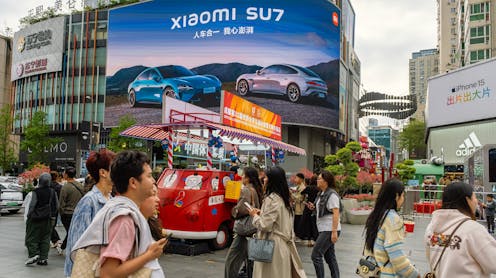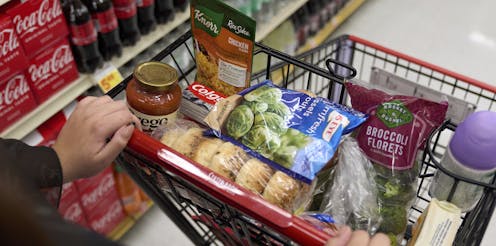A ban on price gouging and new powers to break up supermarkets are on the table this election. Would either work?

With the federal election campaign now underway, Prime Minister Anthony Albanese has promised that if re-elected, Labor would seek to make price gouging illegal in the supermarket sector.
A new taskforce would be set up to examine the best way to do so, drawing on the experience of other countries. The Australian Competition and Consumer Commission (ACCC) would then enforce the new “excessive pricing regime”.
Labor’s proposal comes despite the fact the final report from the ACCC’s supermarkets inquiry didn’t make any explicit accusation of price gouging.
Meanwhile, the Coalition and Greens still want new divestiture powers to break up the supermarkets, a course of action also not recommended by the ACCC’s report.
Price gouging
Price gouging, also referred to as “excessive pricing”, isn’t illegal in Australia. As long as prices are set independently by an individual business – and not in collusion with supposed competitors – they can be set as high or low as desired.
However, the Australian Competition and Consumer Act does allow the ACCC to monitor and regulate the price of some “notified” goods or services – with approval from the relevant federal minister.
One current example are postal services. The ACCC assesses proposed price increases, and can make an objection.
The legal situation on price gouging differs around the world.
The European Union, for example, prohibits abuse of a dominant market position by “directly or indirectly imposing unfair purchase or selling prices”.
It can be difficult to define an “unfair price”. Typically, it’s an excessive, monopolistic price higher than what would be set in a competitive market.
A landmark EU judgement defines an excessive price as one with “no reasonable relation to the economic value of the product supplied”.
Despite this ban, enforcement cases are somewhat rare. The European Commission has been more focused on tackling “exclusionary conduct” in recent decades.
This is when a competitor with significant market power uses restrictive means to directly hurt its competitors and exclude them (and future competitors) from competing in the relevant market.
An example is predatory pricing, where a company sets prices unrealistically low to drive out competitors – then becoming able to set them as high as they would like.
What about divestiture?
Both the Coalition and Greens have pledged to create new “divestiture” powers to break up supermarkets if they were found to be abusing their market power.
In competition law, divestiture is when a commercial entity is ordered to sell a portion of its assets or its business to a third party, to improve competition in the affected market.
Australian law has divestiture powers to address anti-competitive mergers and acquisitions. But currently, there aren’t powers to break up businesses for misuse of market power.
It’s a different picture in the United States, where the government has had powers to break up businesses in the context of “monopolisation” for more than a century.
The risks of splitting up
Divestiture powers were not recommended in the ACCC’s final report. That may be linked to market structure here.
The Australian grocery retail market is highly concentrated. The majority of retail sales are shared among only a few supermarket chains, primarily Woolworths (38%) and Coles (29%).
However, the combined share of these two retail giants has declined over the past 14 years, from 80% to 67%. Meanwhile, Aldi’s market share has grown to 9%, showing these two retailers face some competition.
This suggests divestiture may be a misguided approach. There are specific risks that come with divestiture remedies.
For instance, who would purchase the assets under a specific divestiture order? When considering the structure of the current grocery retail market, there is a high risk it would be another powerful retailer interested in purchasing its competitor’s assets. This would defeat the purpose entirely.
Other measures already in motion
Any ban on price gouging or new divestiture powers should be implemented with caution and used as a temporary tool. Directly interfering with free markets comes with risks.
Other actions are already underway to boost competition in the sector and improve supermarkets’ dealings with suppliers.
The federal government has previously announced incentives for the states to “cut planning and zoning red tape”, with the aim of making it easier for smaller supermarkets to enter the market and compete.
And from April, the Food and Grocery Code of Conduct will be made mandatory and enforceable, in line with a key recommendation of the independent Emerson review.
Certain restrictive and unfair practices in dealing with suppliers will be directly prohibited and enforced.
The new code gives the ACCC a range of useful tools to enforce against a breach by a powerful supermarket chain.
These include:
- a confidential channel for whistleblowing suppliers
- effective dispute resolution to address lengthy and costly litigation
- heavy penalties – as high as A$10 million or 10% of annual turnover – for serious breaches of the code.
Rather than bring in measures that have not been independently recommended – like a price gouging ban or divestiture powers – it would be worth first seeing how these new enforceable rules work to deliver a better deal for supermarket customers.
Authors: The Conversation













